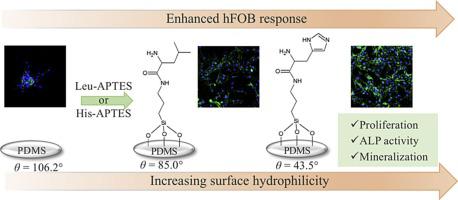Colloids and Surfaces B: Biointerfaces ( IF 5.4 ) Pub Date : 2020-08-27 , DOI: 10.1016/j.colsurfb.2020.111343 M Özgen Öztürk-Öncel 1 , Sedat Odabaş 2 , Lokman Uzun 3 , Deniz Hür 4 , Bora Garipcan 1

|
Polydimethylsiloxane (PDMS) is a biocompatible synthetic polymer and used in various applications due to its low toxicity and tunable surface properties. However, PDMS does not have any chemical cues for cell binding. Plasma treatment, protein coating or surface modification with various molecules have been used to improve its surface characteristics. Still, these techniques are either last for a very limited time or have very complicated experimental procedures. In the present study, simple and one-step surface modification of PDMS is successfully accomplished by the preparation of hydrophilic and hydrophobic amino acid conjugated self-assembled monolayers (SAMs) for enhanced interactions at the cell-substrate interface. Synthesis of histidine and leucine conjugated (3-aminopropyl)-triethoxysilane (His-APTES and Leu-APTES) were confirmed with proton nuclear magnetic resonance spectroscopy (1H NMR) and optimum conditions for the modification of PDMS with SAMs were investigated by X-ray photoelectron spectroscopy (XPS) analysis, combined with water contact angle (WCA) measurements. Results indicated that both SAMs enhanced cellular behavior in vitro. Furthermore, hydrophilic His-APTES modification provides a superior environment for the osteoblast maturation with higher alkaline phosphatase activity and mineralization. As histidine, leucine, and functional groups of these SAMs are naturally found in biological systems, modification of PDMS with them increases its cell-substrate surface biomimetic properties. This study establishes a successful modification of PDMS for in vitro cell studies, offering a biomimetic and easy procedure for potential applications in microfluidics, cell-based therapies, or drug investigations.
中文翻译:

氨基酸共轭自组装单层聚二甲基硅氧烷的表面改性,可增强成骨细胞的行为。
聚二甲基硅氧烷(PDMS)是一种生物相容性合成聚合物,由于其低毒性和可调节的表面性能而被用于各种应用中。但是,PDMS没有任何化学线索可用于细胞结合。等离子体处理,蛋白质包被或用各种分子进行表面修饰已用于改善其表面特性。尽管如此,这些技术要么只能持续很短的时间,要么具有非常复杂的实验程序。在本研究中,通过制备亲水性和疏水性氨基酸共轭的自组装单层(SAMs)来成功完成PDMS的简单且一步一步的表面修饰,以增强细胞-基质界面的相互作用。通过X射线光电子能谱(XPS)分析,结合水接触角(WCA)测量,研究了用SAM改性PDMS的最佳条件(1 H NMR)和最佳条件。结果表明,两种SAM均能增强体外细胞行为。此外,亲水的His-APTES修饰为成骨细胞的成熟提供了优越的环境,具有更高的碱性磷酸酶活性和矿化作用。由于这些SAM的组氨酸,亮氨酸和官能团是天然存在于生物系统中的,因此用它们修饰PDMS可以提高其细胞-基质表面仿生特性。这项研究建立了体外PDMS的成功修饰 细胞研究,为微流体,基于细胞的疗法或药物研究中的潜在应用提供仿生且简便的程序。











































 京公网安备 11010802027423号
京公网安备 11010802027423号